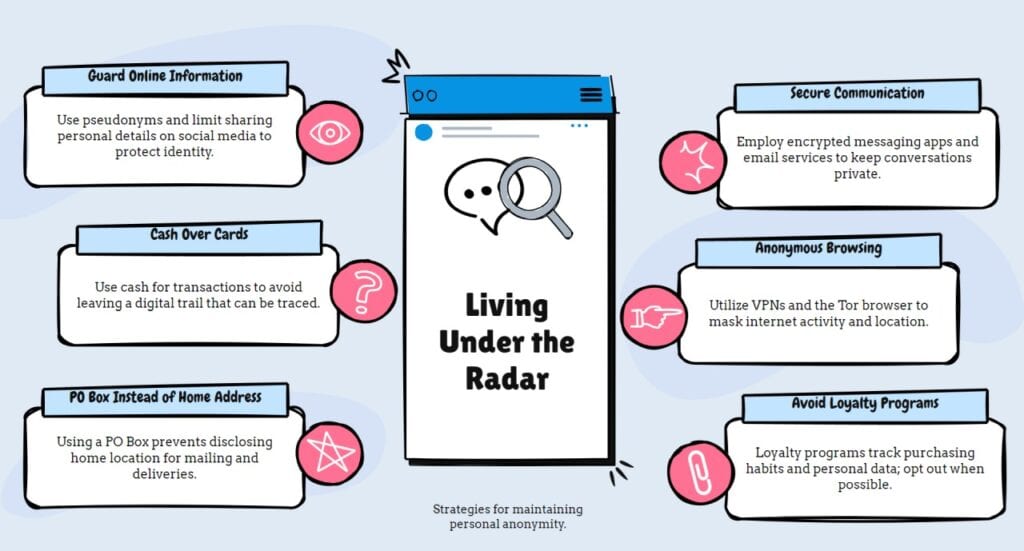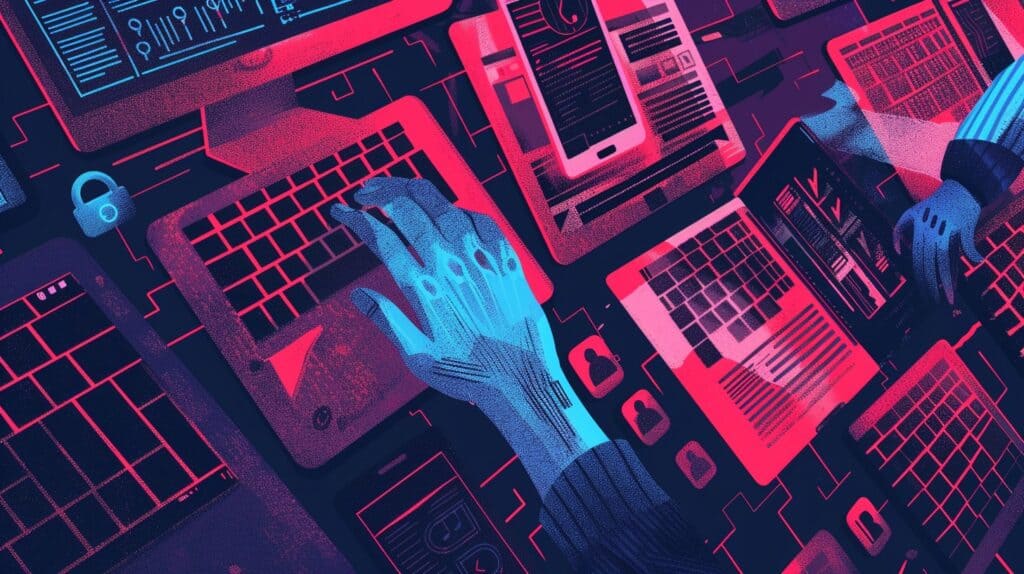Navigating the sensation of being perpetually in the public eye can indeed be daunting. Trust me, I understand that yearning for a quieter existence within this digital age. You’re about to explore a rich resource packed with tactics and tech tips that promise to shepherd you towards the more low-profile lifestyle you crave.
Ready to unearth some secrets for staying under the radar? Let’s get started!
Key Takeaways
Use tools like Signal for encrypted communication and Tor browser to hide online activities.
Manage app permissions on your devices and use ad blockers to stop trackers.
Choose zero-knowledge services, such as ProtonMail, for email and file storage privacy.
Regularly change passwords and use two-factor authentication for added security.
Pay in cash or use prepaid cards, and stay off social media to maintain a low profile.
Table of Contents
Understanding the Difference: Privacy vs. Anonymity

Privacy keeps my business out of sight, like sealing letters before mailing them. Anonymity takes it a step further; it’s like having no return address on that sealed letter. Both protect me in different ways online.
Privacy means my messages and activities are hidden from others through encryption or passwords – think ProtonMail for secure emails or a password manager for keeping all my login details safe.
Anonymity is harder to nail down because it hides who I am when I do something on the web. Using Tor browser helps here since it makes tracking by IP address really tough. Encryption can keep what I say private, but if someone knows it’s me saying it, that’s not being anonymous.
That’s why living anonymously needs more than just a virtual private network (VPN). It means staying off social media, watching for app permissions, and maybe even learning about things like the grey man theory to move unnoticed in public places too.
Guidelines to Achieve Online Anonymity

In the quest to shield our digital footprint from prying eyes, mastering online anonymity is a vital survival skill. I’ll guide you through concrete steps and tools designed to cloak your virtual presence, ensuring that your personal data remains just that—personal.
Using Signal for Secure Communication
I need to keep my chats private. That’s why I use the Signal app for secure communication.
- Download the Signal app from the app store on your phone.
- Make sure you follow the setup instructions. It will ask for your phone number to start.
- Tell your friends to get Signal too. This is important because both sides need the app for full privacy.
- Start a new chat by tapping on the pencil icon in Signal. Choose a contact who also uses Signal.
- Notice how there’s a little lock near their name? This means your chat is private and secure.
- Enjoy clear voice and video calls without worrying about eavesdroppers. All calls through Signal are private.
- Check out the settings menu in Signal. You can tweak things like disappearing messages for extra security.
- Always update Signal. The latest version has strong privacy features and fixes old problems.
Browsing with Tor for Anonymity
Hey there, you want to browse the web without leaving a trace? Tor is your friend in the quest for online anonymity. Let me guide you through using it:
- Start by downloading and installing the Tor browser from the official site.
- Open Tor and wait as it connects to the network; this is how you get into the protected space.
- Understand that Tor hides your location by passing your connection through several servers around the world.
- Remember not to sign in to personal accounts or use information that identifies you while on Tor.
- Keep in mind, Tor can be slower than your usual browser because of all the extra steps to keep you hidden.
- Avoid downloading files like PDFs or Word docs, since they can reveal your true IP address once opened outside of Tor.
Misconceptions about Anonymity and VPNs
Many guys think using a VPN makes them invisible online. But that’s not true. A VPN hides your IP address, which can keep your location private. However, it doesn’t erase footprints you leave on sites you visit or accounts you log into.
This is where understanding the benefits of SurfShark VPN comes into play, not just for its essential role in safeguarding your privacy but also for its additional features that combat common misconceptions. SurfShark VPN offers CleanWeb™ technology to block ads, trackers, and malware, plus features like Whitelister™ that allow specific apps or websites to bypass the VPN. These advantages provide a more nuanced approach to online privacy than simply hiding your IP address.
Some people also believe that having a VPN is enough for complete privacy. They forget that many companies track us through cookies and apps we use daily. So even with a VPN, if I’m not careful about cookie settings and app permissions, I could still be sharing more than I want to.
Now let’s talk about zero-knowledge services as another layer of protection for living anonymously.
Utilizing Zero-Knowledge Services
I want my files and messages to stay private, so I use zero-knowledge services. They don’t peek into my data, giving me control over my privacy.
- Choose SpiderOak for file storage. It encrypts data before it leaves my computer. This means even the people running the service can’t see what I store.
- Send emails through ProtonMail. They offer end-to-end encryption for email messages. Not even ProtonMail can read them.
- Understand that encryption keeps information private but doesn’t hide who I am. My identity might still be visible.
- Remember, trusting a VPN to make me anonymous is risky. The VPN knows where I go online and could share that info if they wanted to.
- Pay attention to each service’s privacy policy. They should clearly state they can’t access or decrypt my stuff.
- Sign up for these services without using personal details when possible. It helps in keeping me disconnected from the data stored there.
- Regularly change passwords and use strong combinations of characters. Good security habits protect against hacks and leaks.
- Consider two-factor authentication for an extra layer of security on these accounts. This makes it harder for anyone else to get in.
Good Practices for Online Anonymity

Maintaining your digital shadow to a minimal footprint means adopting certain behaviors as routine. I’m going to share insights and strategies that you can integrate into daily habits to protect your anonymity without sacrificing the conveniences of modern technology.
Careful Posting Online
I like to stay under the radar online. Keeping my private life safe is key.
- Think before you post. Every photo, comment, or check – in can give away personal details.
- Edit your privacy settings on social media platforms. Make them as tight as possible to control who sees your stuff.
- Avoid sharing locations. You never know who’s watching and might figure out where you live or hang out.
- Keep personal info private. Don’t share things like your address, phone number, or birthday online.
- Post nothing that might embarrass you later. The internet never forgets, and future employers might see it.
- Be careful with friend requests. Only accept people you really know and trust.
- Double-check tags in photos. Untag yourself from anything iffy that could hurt your reputation.
- Use nicknames instead of real names when possible. It’s harder for strangers to connect the dots.
- Limit details about work life. Talking too much about your job can lead to security risks or job loss.
- Review older posts regularly and clean up anything that doesn’t match how you want to be seen now.
Checking App Permissions
I take my privacy seriously. It’s crucial to keep a close eye on app permissions to stay under the radar.
- Know your apps. Always check what permissions an app asks for before you hit ‘install.’
- Manage permissions. Go to your phone settings after installation and review which permissions are enabled.
- Turn off extras. Disable any permission that doesn’t seem necessary for the app to function.
- Update your choices. Revisit permissions regularly, especially after app updates.
- Read carefully. Look at the details when an app requests access to your contacts, camera, or microphone.
- Use trusted sources. Download apps from reputable app stores that vet their content for safety.
- Check reviews. Other users may mention if an app misuses permissions—pay attention to what they say.
- Question the need. Ask yourself why a simple game needs access to your text messages or call history.
- Limit location access. Only enable GPS for navigation apps; others don’t usually need it.
- Secure personal data. Prevent apps from accessing personal info like photos unless it’s essential.
Using an Ad Blocker
Ad blockers are my go-to tool for living more anonymously online. They stop trackers and ads from following me as I browse the web.
- First, install a trusted ad blocker on your browser. This means choosing one that has strong reviews and is known for valuing user privacy.
- Understand that ad blockers work by blocking tracking scripts. These scripts would normally collect information about where you go and what you do on the internet.
- Enjoy faster browsing speeds once you have an ad blocker. Without all those ads loading, websites open up quicker.
- Feel safer knowing that ad blockers reduce the risk of malware. Many times, harmful software hides inside ads, waiting to infect your device.
- Notice fewer annoying pop – ups and banners with an ad blocker active. Your online reading won’t be interrupted by ads jumping in your face anymore.
- Remember to check for updates regularly. Ad blocking tools need the latest rules to block new types of trackers and ads effectively.
- Consider supporting websites you love differently if they ask. Some sites rely on ad revenue, so look for other ways to help them out, like donations or subscriptions.
- Be aware that some sites might not work properly with an ad blocker. In these cases, you may need to disable it temporarily to use the site fully.
- Choose websites that respect your choice to use ad blockers. If a site requires turning off your blocker just to access content, think about if it’s worth your privacy trade-off.
- Combine your ad blocker with other privacy tools for stronger anonymity. Think about using a VPN or secure browsers like Tor alongside your ad blocker for added protection.
Avoiding Home Assistants
Moving on from ad blockers, let’s talk about dodging home assistants. These devices may seem helpful, but they can be a real problem for living under the radar.
- Ditch the smart speakers: Devices like Alexa or Google Home are always listening. Unplug them and you’ll stop sharing your private conversations.
- Disable voice control on your gadgets: Your phone and TV might have voice recognition too. Turn this feature off to keep things quiet.
- Choose non-smart appliances: When upgrading your gear at home, pick options without internet connections. This means no sneaky data collection.
- Secure your Wi-Fi network: If you must have smart devices, protect your home Wi-Fi with a strong password. This makes it harder for hackers to listen in.
- Read privacy policies: Before buying any new gadget, check how it handles your information. If it’s not clear, don’t buy it.
- Cover cameras and microphones: Even if they’re turned off, cover up any cameras or mics on your devices. You can use tape or special covers sold online.
Tools for Enhancing Online Anonymity

To stay under the radar, we’ll dive into a toolkit designed for keeping your digital footprint virtually untraceable; read on to discover how these tools can fortify your cloak of anonymity online.
VPN for Privacy
I always use a VPN to keep my online moves private. Here’s the deal: a VPN scrambles all the data coming from my computer, phone, or tablet. It’s like sending secret messages that only you and your buddy know how to read.
This means no hackers, nosy companies, or even my internet service provider can snoop on what I’m doing. I get total control over who sees what.
For instance, if I’m keen on joining fantasy leagues but face restrictions in the U.S., there’s an easy fix. With a VPN, platforms like DraftKings are no longer out of reach. All it takes is connecting to a server where it’s permissible, and voilà, I’m in! Choosing the right VPN service is critical, ensuring it doesn’t log my activities and provides strong encryption.
That way, every move I make online stays strictly between me and the sites I visit.
Incognito Mode and its Limitations
While a VPN can shield my online activities, incognito mode in web browsers like Chrome offers less protection. This private browsing feature may stop others who use my computer from seeing my history, but that’s where the privacy benefits end.
It doesn’t hide my IP address or protect against surveillance by internet service providers (ISPs). So even with incognito mode, someone could still track what I do online.
Let’s get something straight about going incognito – it’s not a cloak of invisibility. All it does is clear out cookies and browsing history after I close the window. Anyone monitoring the network, like an ISP or Wi-Fi access point owner at a coffee shop, can see every site I visit.
Incognito won’t save me from prying eyes on the internet; those ads following me around? They know I’m there, VPN or not.
The Reality of Online Anonymity

Exploring the reality of online anonymity unveils a complex web where true invisibility is a myth, but strategic actions can significantly enhance privacy—dive in to discover how close we can really get.
Can True Anonymity Be Achieved Online?
I’ve been digging deep into online anonymity, and here’s the hard truth: it’s a tough game to win. We can use Tor or secure messaging like Signal, but achieving true invisibility on the internet is really difficult.
Every move we make leaves digital footprints that someone could track.

To get close, I need tools like anonymous operating systems and payments with cryptocurrencies such as Monero. Even then, there’s no promise of being completely hidden. Sure, I encrypt my emails with Proton Mail and dodge tracking cookies by using privacy-focused browsers like Brave or Firefox with Privacy Badger.
But still, somewhere along the line, from Wi-Fi access points to our own ISP peeking in, total secrecy remains elusive.
Potential Consequences of No Online Privacy
Living without online privacy is like leaving your diary open in a crowded room. Anyone can peek into your personal life. Your private messages, bank details, and even daily routines are up for grabs.
Hackers could swipe your identity or drain your accounts while you’re none the wiser.
Advertisers get their hands on our browsing habits, too. They use this data to bombard us with ads tailored just for us. It’s hard to escape those pesky targeted ads following you from one site to another.
Now let’s talk tools; there are ways to keep prying eyes off our digital trails…
Steps to Track Online Activities

I need to keep an eye on my online tracks. Here’s how I make sure no one else can follow my digital footprint.
- Use a VPN: I always connect through a VPN to hide my IP address from websites and my internet service provider.
- Go Incognito: When searching the web, I use private mode to prevent my browser from saving history or cookies.
- Check Browser Extensions: I review my browser add-ons regularly, especially ones like Ghostery, to block trackers.
- Clear Cookies Regularly: After browsing, I clear cookies and site data to remove any leftover traces of my activity.
- Opt for Secure Browsers: I prefer browsers like Brave or Firefox that focus on privacy and limit data sharing with sites.
- Avoid Social Media Oversharing: Posting less on platforms like Facebook helps me keep a low profile.
- Adjust App Permissions: On my smartphone, I only grant necessary permissions to apps to minimize data leaks.
- Use Privacy-Focused Search Engines: Instead of Google, I search with DuckDuckGo or Startpage for anonymous searching.
- Communicate Securely: Apps like Signal ensure that my messages stay encrypted and away from prying eyes.
- Monitor Connected Home Devices: Smart home gadgets often collect data, so I disable unnecessary features on IoT devices.
Community Questions and Answers on Living Anonymously

Folks often ask me how they can keep their travel under wraps. You want to roam like you’ve got that one-percenter clout, with no trail behind you. Think Jason Bourne or Tyler Rake sneaking through a crowd.
It’s about the little things: use different names for hotel bookings, and pay in cash when you can. Toss the loyalty cards; they’re tracking bait.
You asked if social media privacy is real? Let me tell ya, every post can blow your cover. Want to share that epic sunset or fancy meal? Pause and consider who’s watching. Are those likes worth your hideout being blown? Stick to private profiles and think twice before hitting ‘share’.
Control your digital footprint like it’s top secret – because it is, right?
Tips for Living Anonymously

Living anonymously takes careful planning and smart habits. Here are some tips to keep your identity under wraps.
- Use cash or prepaid cards when possible. Avoid using credit cards that link to your real name.
- Get a P.O. Box for mail. Never use your home address.
- Choose user names that don’t hint at your real identity for online accounts.
- Limit social media sharing, or stay off social platforms altogether.
- Regularly clear your browser history and cookies.
- Opt out of data collection on websites whenever you can.
- Encrypt sensitive files before storing them on cloud services like ProtonDrive or using external drives.
- Use encrypted email services such as Tutanota instead of providers like Gmail or Yahoo Mail.
- Turn off location services on your devices and always check app permissions.
- Create strong passwords that are different for each account, and use a password manager to keep track of them.
- Use privacy-focused browsers like Tor or Brave rather than Chrome or Safari.
- Consider using a VPN, but research providers carefully to find one that doesn’t log traffic.
- Always update software to protect against vulnerabilities and viruses.
- Disconnect from the internet when you’re not actively using it to reduce exposure risks.
FAQs On How to Live Anonymously
What does it mean to travel anonymously?
Traveling anonymously means moving around without revealing your identity. It’s like how very rich people, or one-percenters, move without being noticed.
How can I browse the web without being tracked?
Use a secure browser like Firefox or Brave and turn on privacy settings. This helps stop websites from saving third-party cookies that track you. You can also use tools like a VPN (virtual private network), proxy servers, or the Tor Project for extra safety.
Can I keep my files private when using cloud storage services?
Yes, encrypt your files before uploading them to Google Drive, Dropbox, or MEGA. Use HTTPS to keep your connection safe, and think about more private options if needed.
What steps should I take to protect my home network?
Change the default settings of your home router and use strong passwords. Encrypt your Wi-Fi with SSL (secure sockets layer) technology for extra protection.
Are messaging apps like WhatsApp good for digital privacy?
Not all messaging apps are equal in privacy protection. ProtonVPN offers email encryption, which is safer than some popular apps. Look for those with strong encryption standards and minimal data collection policies.
What should I do if I want high internet privacy on social media sites?
To be anonymous on social media platforms such as Facebook or Instagram: don’t share personal info; turn off location services; use fake names if allowed. Always read their policy to understand how they handle your data.




